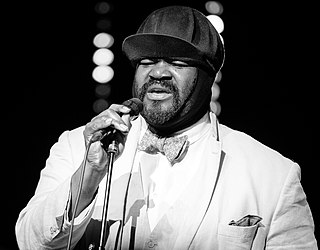A Quote by Gregory Porter
As well as having a really strong message, sometimes an artist needs to couple their sentiment with something that's soulful and groovy to listen to.
Related Quotes
Pain - physical, emotional and spiritual pain - is more than just a condition that needs to be silenced, numbed or "fixed." Pain in all its forms is also a message, a kind of distress signal to our hearts and minds. There are times when it's really important to tune into that message and just listen to it. When we don't listen, our understanding of the world gets more and more distorted, and we become capable of doing things we very often regret.
There is something about important stories that is not just the message, but also the way that message is conveyed, the arrangement of the words, the felicity of the language. So it's really a balance between your commitment, whether it's political or economic or whatever, and your craft as an artist.
We think of communication as words. But a screaming child is trying to say something. A tantrum carries a message. Hitting is communication. Sleep patterns carry a message. Even the sulky belligerence of a teen is an attempt to convey a message. Everything the child does says something to the person who is willing to take the time to listen carefully.




































